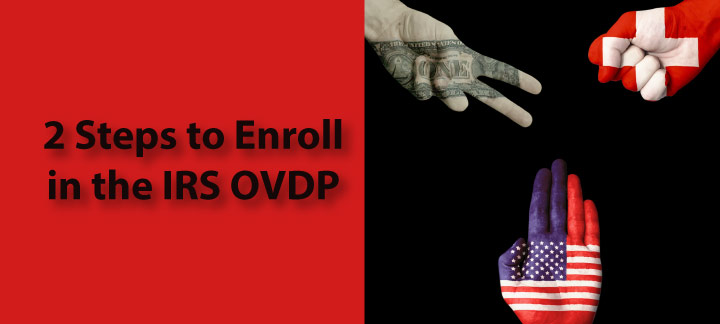2 Steps to Successfully Enrolling in the IRS OVDP
In order to qualify for the Offshore Voluntary Disclosure Program, a taxpayer must comply with all the requirements set forth by the IRS. There are a number of document submissions, penalties, and payment of certain unpaid taxes which the taxpayer must satisfy to make a successful submission for protection under OVDP.
What are the Required Steps Under the Offshore Voluntary Disclosure Program?
Before making an OVDP submission, the taxpayer must make a pre-clearance submission to the IRS’s Criminal Investigation division. Upon approval by the Criminal Investigation division, the taxpayer will receive a pre-clearance letter which clarifies the necessary next steps in the OVDP process. The voluntary disclosure submission must be made in two steps. First, the taxpayer must submit payment for a variety of taxes, interest, and penalties associated with the previously undisclosed foreign financial accounts and assets. Second, specific documents must then be submitted to the IRS to complete the OVDP application.
What Taxes, Interest, and Penalties Must be Submitted Under OVDP?
The pre-clearance letter sent by the Criminal Investigation division will provide instructions to the taxpayer as to the amount of taxes, interest, and penalties due under the OVDP submission. As the first step in the OVDP process, the taxpayer is required to submit to the Department of the Treasury these amounts indicated on the pre-clearance letter. This figure may include back taxes, the offshore penalty, the failure-to-file penalties and failure-to-pay penalties. These payments should be sent to the Department of Treasury with information identifying the taxpayer name, taxpayer identification number, and years to which the payments relate (1). The IRS has also specified the manner in which the payments should be sent. Separate checks containing amounts for back taxes, interest, accuracy-related penalties, failure-to-file penalties, and failure-to-pay penalties should be made for each tax year. To ensure proper processing, the offshore penalty for each year should me contained in a separate check (2).
If a taxpayer is unable to pay the entire amount of tax, interest, and penalties require by the submission, he or she can attempt to submit a proposed payment arrangement to the IRS, along with completed Collection Information Statement (Form 433-A, Collection Information Statement for Wage Earners and Self-employed Individuals, or Form 433-B, Collection Information Statement for Businesses, as appropriate (3).
How a Tax Attorney Can Help
If you have undisclosed offshore foreign accounts or assets, you may be eligible to participate in OVDP. In order to evaluate whether OVDP is the right decision for your international tax situation, you should consider consulting a knowledgeable tax attorney. The OVDP program is rapidly changing, but a tax attorney can help you navigate the confusing aspects of the IRS program.
The Tax Lawyer - William D Hartsock Tax Attorney Inc. has been successfully helping clients with tax issues related to their foreign assets since the early 1980s. Mr. Hartsock offers free consultations with the full benefit and protections of attorney client privilege to help people clearly understand their situation and options based on the circumstances of their case. To schedule your free consultation simply fill out the contact form found on this page, or call (858) 481-4844.
Tax Law Resources:
- Offshore Voluntary Disclosure Program Frequently Asked Questions and Answers, FAQ 25, http://www.irs.gov/Individuals/International-Taxpayers/Offshore-Voluntary-Disclosure-Program-Frequently-Asked-Questions-and-Answers-2012-Revised.
- Offshore Voluntary Disclosure Program Frequently Asked Questions and Answers, FAQ 25, http://www.irs.gov/Individuals/International-Taxpayers/Offshore-Voluntary-Disclosure-Program-Frequently-Asked-Questions-and-Answers-2012-Revised.
- Offshore Voluntary Disclosure Program Frequently Asked Questions and Answers, FAQ 25, http://www.irs.gov/Individuals/International-Taxpayers/Offshore-Voluntary-Disclosure-Program-Frequently-Asked-Questions-and-Answers-2012-Revised.



Comments (0)